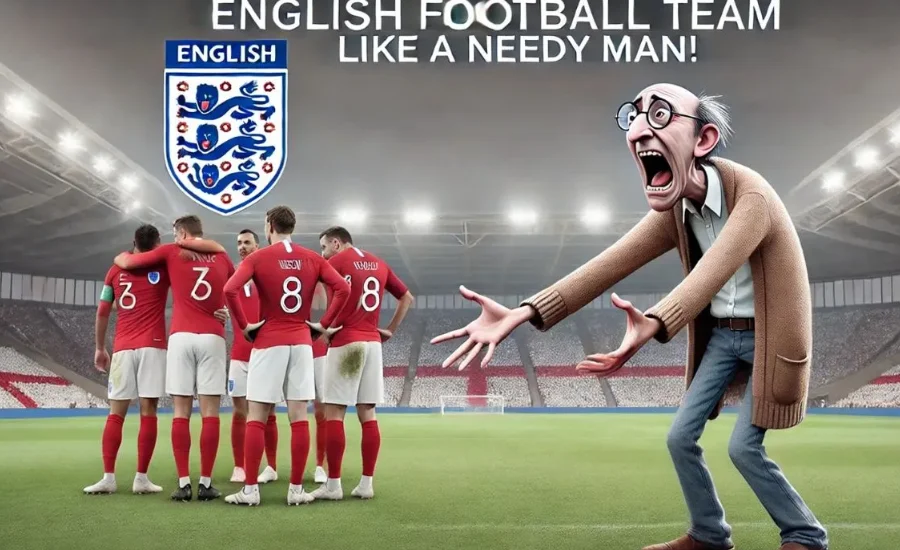Introduction
The English football team has long been a subject of fascination and speculation in the world of sports. Their performances on the global stage, particularly in major tournaments like the FIFA World Cup and the UEFA European Championship, have been both exhilarating and frustrating for fans. This duality has created a unique dynamic between the team and its supporters. One moment they are riding high on the crest of success, and the next they seem to falter when it matters most. Over time, this up-and-down journey has given rise to countless discussions and criticisms. However, perhaps none have captured the public imagination quite like the comparison between the English football team and the ‘needy man’ meme.
The ‘needy man’ meme is a satirical representation of someone who is overly eager to gain approval or affection but often fails due to their desperation. In the context of English football, this comparison resonates deeply. The team has often been portrayed as one that desperately seeks validation on the global stage, only to stumble at crucial moments, leaving fans heartbroken and frustrated. This meme encapsulates the cycle of high expectations followed by disappointment—a pattern that has plagued the English national team for decades.
This article delves into this unique comparison, exploring the historical performances of the English football team, its interactions with fans, and the broader context of the “needy man” metaphor. We will examine key experiences, analyze performance statistics, and investigate the psychological and social aspects of the team’s global reputation. Moreover, we will offer a fresh perspective on whether the English football team truly deserves this comparison, or if it’s time to reassess how we view them in both a sporting and cultural context.

Historical Overview: A Legacy of Expectation and Disappointment
To understand why the English football team is often compared to the ‘needy man’ meme, it’s essential to look back at the team’s history. England, the birthplace of football, has long been considered one of the sport’s leading nations. Yet, despite this illustrious heritage, the English national team has only one major international tournament victory—the 1966 World Cup, held on home soil. This triumph, while historic, has become something of a burden for subsequent generations of English footballers. Every major tournament since has been overshadowed by the expectation of “bringing football home,” a phrase that is synonymous with English optimism ahead of each competition.
Over the decades, the English team has entered numerous World Cups and European Championships with great promise, only to fall short when it matters most. From the dramatic semi-final loss to Germany in the 1990 World Cup to the infamous penalty shootout defeats in the 1998 World Cup and Euro 2004, these moments have etched themselves into the collective memory of English football fans. Each loss is greeted with a mix of resignation and frustration, fueling the narrative of England being a team that gets close but can never quite clinch the ultimate prize.
This pattern of near success and ultimate failure fits well with the idea of the ‘needy man.’ Just as the needy individual craves validation but often ends up pushing people away with their desperation, the English team seems to yearn for global recognition but falters under pressure. The weight of history and the constant comparisons to the 1966 team only exacerbate this dynamic. Instead of confidently striding into major tournaments, the team often appears burdened by the past, adding to the sense of desperation that the ‘needy man’ metaphor encapsulates.
The Meme as a Cultural Commentary
Memes have become a potent form of cultural commentary in the digital age, offering a humorous and often exaggerated take on real-life situations. The ‘needy man’ meme, which originated as a way to poke fun at individuals who are overly eager for approval, has been co-opted into various contexts, from relationships to professional life. In the case of the English football team, the comparison taps into deep-seated frustrations about the team’s repeated failures on the world stage.
This meme reflects more than just a surface-level critique of the team’s performance. It speaks to the psychological experience of being a fan of the English national team. For many supporters, there is a sense of unrequited love—a feeling that no matter how much they invest emotionally, the team fails to deliver when it counts. This dynamic mirrors the ‘needy man,’ who is so focused on obtaining approval that they sabotage their own chances of success.
At the same time, the meme also serves as a form of collective therapy. By turning their frustrations into humor, English football fans can cope with the emotional rollercoaster of supporting their national team. The meme allows fans to laugh at their own desperation and disappointment, creating a sense of solidarity in shared suffering. In this way, the ‘needy man’ meme acts as both a critique of the team’s performance and a coping mechanism for fans who have endured decades of heartbreak.
Key Experiences That Shaped the ‘Needy Man’ Comparison
Several key moments in English football history have contributed to the ‘needy man’ comparison. These experiences, marked by high expectations and dramatic failures, have solidified the idea that England is a team that craves success but can’t seem to achieve it. Below are some of the most significant events that have fueled this narrative:
Euro 1996:
Held on home soil, this tournament was seen as England’s best chance to win a major international title since 1966. The team reached the semi-finals, but once again, they were undone by penalties, losing to Germany in a match that epitomized their inability to handle pressure in crucial moments. The image of Paul Gascoigne’s tearful reaction to the loss has become one of the most iconic symbols of English football’s unfulfilled potential.
World Cup 1998:
England’s World Cup campaign in 1998 was marked by one of the most infamous moments in the country’s football history—David Beckham’s red card in the round of 16 match against Argentina. Despite a valiant effort, England was knocked out of the tournament in a penalty shootout, reinforcing the narrative of glorious failure.
Euro 2004:
Once again, penalties proved to be England’s undoing in Euro 2004, as they were eliminated by Portugal in the quarter-finals. This defeat was particularly painful because it came after a string of strong performances in the group stage, raising hopes that England might finally overcome their demons.
World Cup 2010:
England’s dismal showing in South Africa was a nadir for the national team. Their 4-1 loss to Germany in the round of 16, in which a controversial disallowed goal by Frank Lampard played a central role, left fans questioning the team’s ability to compete at the highest level. The performance was so poor that it seemed to confirm the ‘needy man’ comparison, as England appeared desperate for success but woefully unprepared to achieve it.
World Cup 2018:
England’s semi-final appearance in the 2018 World Cup, under the guidance of Gareth Southgate, briefly offered hope that the team had turned a corner. However, their extra-time loss to Croatia once again highlighted their inability to close out big games. While the team was praised for its progress, the result reinforced the idea that England remains tantalizingly close to greatness but not quite able to grasp it.

The ‘Needy Man’ Metaphor and Performance Analysis
Beyond the emotional and cultural aspects of the ‘needy man’ comparison, there is also a performance-based dimension to consider. Over the years, the English football team has been consistently ranked among the top teams in the world, yet their actual performances in major tournaments have often fallen short of expectations. This disconnect between potential and achievement is central to the ‘needy man’ metaphor, as it suggests that England, much like the needy individual, possesses the ability to succeed but is held back by its own anxieties and insecurities.
When we break down England’s performances in major tournaments, several patterns emerge. The team often performs well in the group stages, showcasing their technical ability and tactical discipline. However, as the tournament progresses and the pressure mounts, England tends to falter. This is particularly evident in knockout matches, where the team has a dismal record, especially in penalty shootouts. England’s poor record in penalty shootouts (losing 7 out of 9 since 1990) has become emblematic of their struggles under pressure. The penalty shootout, with its emphasis on nerve and mental fortitude, is a microcosm of England’s broader issues in major tournaments. It requires confidence, composure, and a sense of calm—all qualities that the ‘needy man’ meme suggests England lacks when the stakes are highest.
Furthermore, the team’s reliance on individual moments of brilliance, rather than cohesive team play, has often been their downfall. In recent years, there have been glimpses of a more unified and strategic approach under managers like Gareth Southgate. However, the psychological scars of past failures continue to loom large, contributing to a sense of desperation that the ‘needy man’ meme perfectly encapsulates.
Psychological and Social Factors
The ‘needy man’ comparison isn’t just about on-field performance; it’s also rooted in the psychological and social factors surrounding English football. The intense scrutiny from the media, the passionate and often unforgiving fanbase, and the weight of history all contribute to a pressure-cooker environment that can be overwhelming for players and managers alike.
The English media plays a particularly significant role in shaping public perception of the national team. Before every major tournament, there is a predictable cycle of hype and optimism, fueled by the press, which sets the team up for a fall. The build-up is often characterized by declarations of how this will be the year that England finally ends its trophy drought, only for the narrative to shift dramatically when the team underperforms. This cycle mirrors the emotional volatility of the ‘needy man’—so desperate for success that every setback feels catastrophic.
For the players, this intense scrutiny can be both motivating and debilitating. On one hand, there is a desire to live up to the high expectations placed upon them. On the other hand, the fear of failure, compounded by the knowledge that the media and fans will be unforgiving, can create a sense of paralysis. This psychological burden has been cited by several former England players as a key factor in the team’s struggles. The pressure to perform for both the fans and the media can lead to mistakes, lapses in concentration, and a lack of confidence—traits often associated with the ‘needy man.’
The Role of the Fans
Fans are the lifeblood of any football team, and the relationship between the English national team and its supporters is particularly complex. English football fans are among the most passionate in the world, and they expect their team to reflect that passion on the pitch. However, over the years, this passion has often turned into frustration, particularly when the team fails to live up to expectations. This frustration has, in turn, led to the development of the ‘needy man’ comparison, as fans feel that their emotional investment is not reciprocated by the team’s performances.
At the same time, English football fans are also deeply loyal, and they continue to support the team despite decades of disappointment. This loyalty, however, comes with a price. The constant cycle of hope and despair can take an emotional toll on fans, leading to a sense of cynicism and resignation. For many, supporting England feels like a one-sided relationship, where they give everything and receive little in return. This dynamic is perfectly encapsulated by the ‘needy man’ meme, which speaks to the feeling of being let down by someone who is desperate for approval but unable to deliver.

Breaking the Cycle: Can England Overcome the ‘Needy Man’ Syndrome?
The question remains: can the English football team break free from the ‘needy man’ comparison and finally achieve sustained success on the global stage? In recent years, there have been signs that the team is making progress. Under Gareth Southgate, England has adopted a more pragmatic and disciplined approach, reaching the semi-finals of the 2018 World Cup and the final of Euro 2020. These achievements suggest that the team is moving in the right direction, but the ultimate goal—winning a major international trophy—still eludes them.
One of the key factors in overcoming the ‘needy man’ syndrome will be addressing the psychological aspects of the team’s performance. This includes managing the pressure and expectations that come with playing for England, as well as developing the mental resilience needed to succeed in high-stakes situations. Southgate has made significant strides in this area, fostering a positive team culture and promoting a sense of unity and togetherness among the players. However, the true test will come when England finds itself in another critical knockout match or penalty shootout.
Additionally, the team must continue to evolve tactically and strategically. While individual moments of brilliance can win games, it is cohesive team play and a clear tactical identity that win tournaments. Southgate has implemented a more structured and disciplined approach, but there is still room for improvement, particularly in terms of creativity and attacking play. If England can strike the right balance between pragmatism and flair, they may finally be able to shed the ‘needy man’ label and establish themselves as a consistent force on the global stage.
Conclusion
The comparison between the English football team and the ‘needy man’ meme is both humorous and poignant. It captures the emotional rollercoaster of supporting England, a team that has long been burdened by the weight of history and the expectations of its fans. While the ‘needy man’ metaphor may offer a convenient explanation for England’s struggles, it also highlights the complexity of the team’s relationship with its supporters and the psychological challenges that come with playing at the highest level.
As England continues to strive for success, there is hope that the team can break free from this comparison and finally achieve the glory that has eluded them for so long. Whether that happens in the near future or remains a distant dream, one thing is certain: the journey of the English football team, with all its highs and lows, will continue to captivate and frustrate in equal measure.









